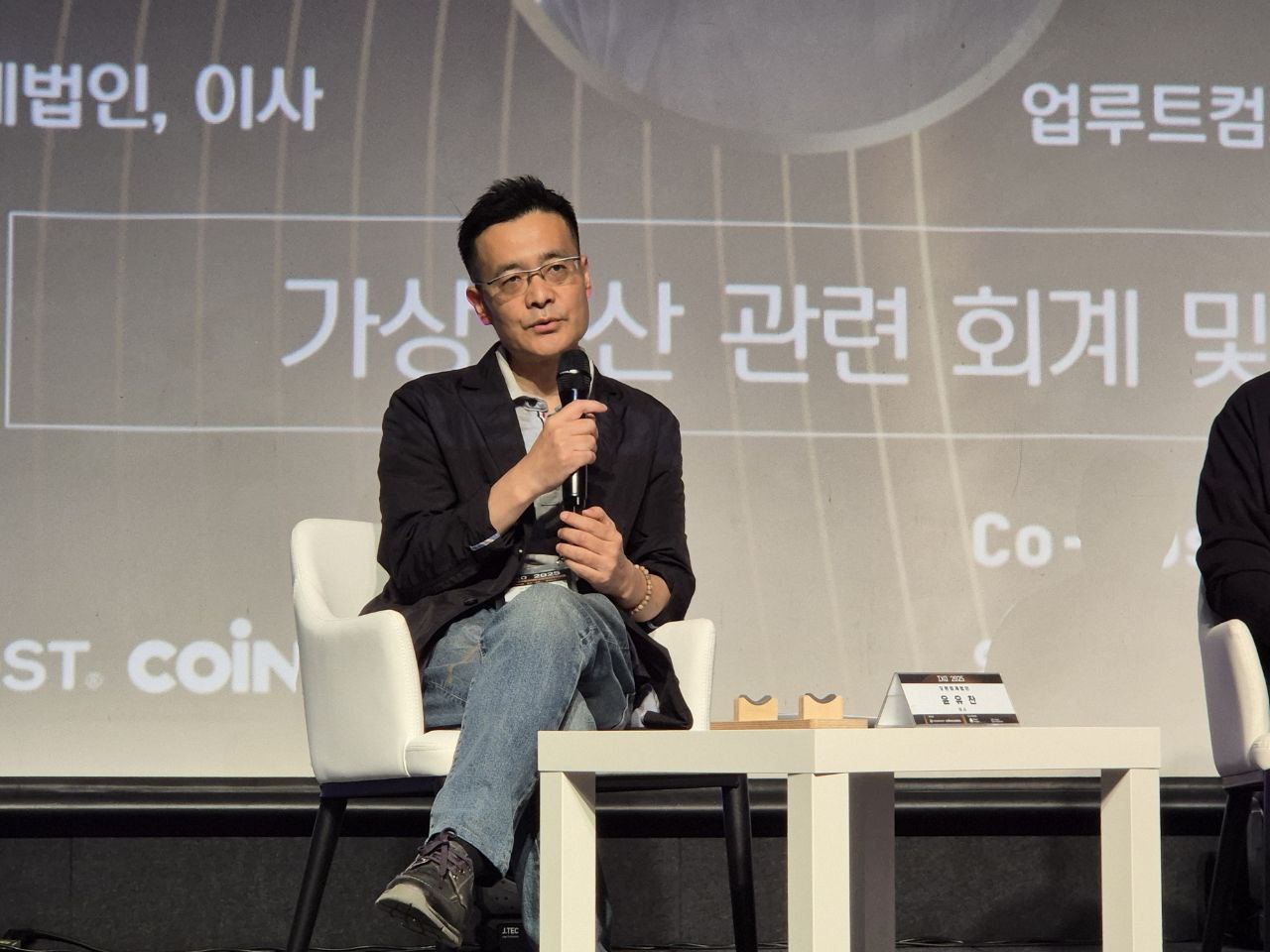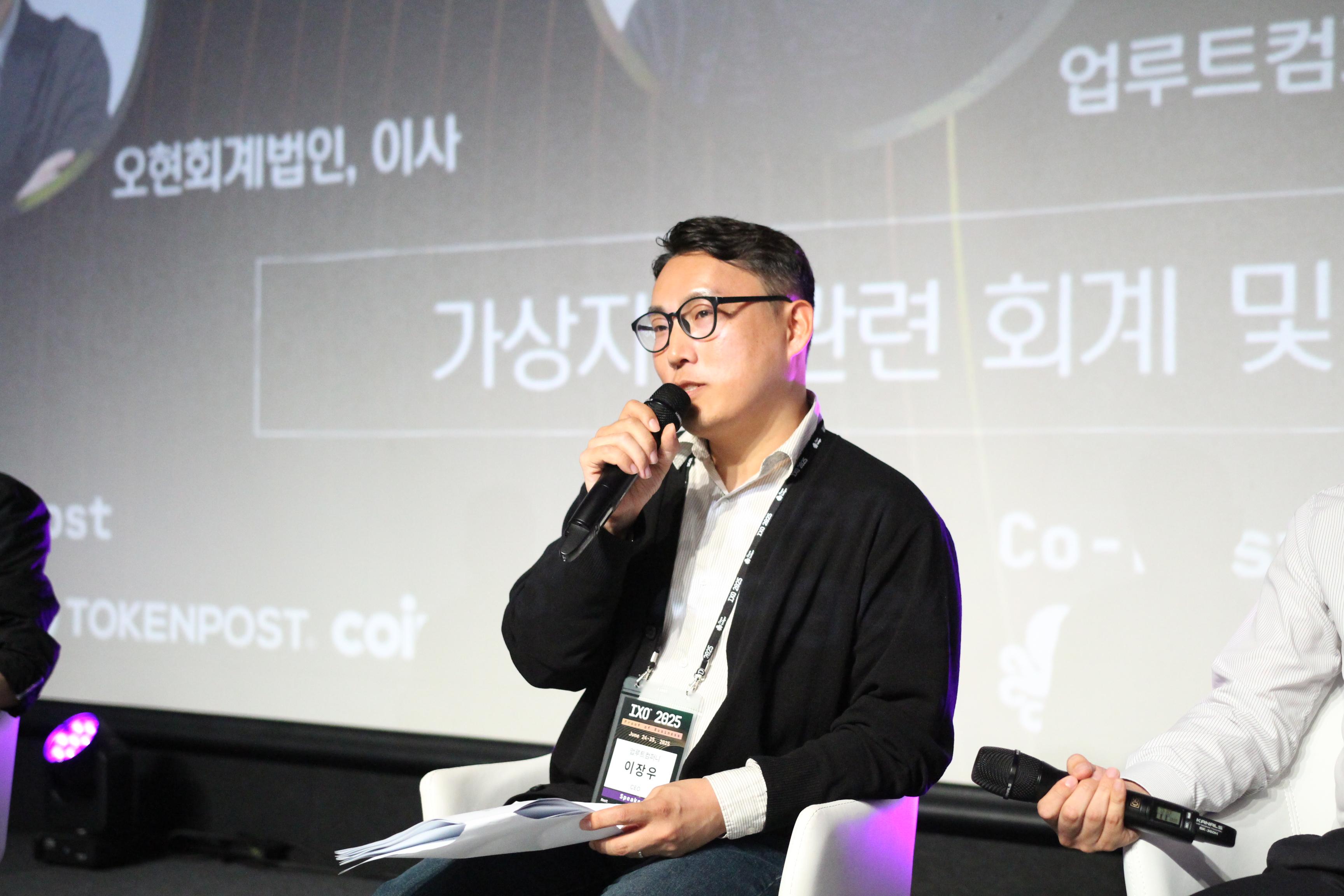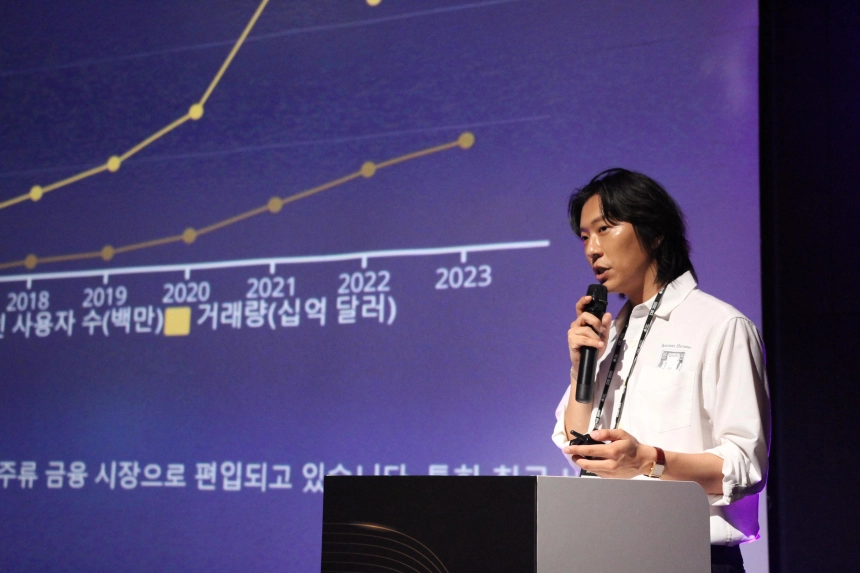Staking profits, unlisted coin market valuation, USDT payment for labor costs, and other virtual asset accounting and tax practice issues were discussed. The panelists emphasized that "accurate standards and responses are needed according to the principle of substantive taxation."
On the 25th, a panel session on "Virtual Asset Accounting: Difficulties and Solutions in the Field" was held at the Global Web3 Roadshow "IXO™ Season 3" at the Seoul Textile Center. Yun Yu-chan, director of Oh Hyun Accounting Firm, served as the moderator, with Lee Jang-woo, CEO of Uproot Company, and Kwon In-wook, a tax accountant from IW Tax Office, participating as panelists.
Director Yun introduced that "this session will focus on discussing practical issues in virtual asset accounting and tax processing." This reflects the growing interest in accounting and taxation among investors as corporate acquisition of virtual assets is permitted from the second half of this year and the Digital Asset Basic Law is proposed.
He said, "Accounting and tax processing for actual use of virtual assets (such as sales, labor cost payments) is being pointed out as a major difficulty in practice." Citing his experience as CFO of ProBit Exchange, where he paid overseas developer labor costs in USDT, he explained that "the withholding tax standards under tax law are ambiguous, causing difficulties for practitioners."
He added, "With the recent increase in stablecoin-based overseas payments and active market entry by global companies, we want to discuss accounting and tax response measures when using virtual assets as a payment method in Korea."

CEO Lee Jang-woo said, "As stablecoin payments increase, discussions about tax and accounting processing are becoming active."
He explained, "Ultimately, when paying with virtual assets (Ethereum, stablecoins, Bitcoin, etc.), the basic transaction structure of service provision and payment receipt remains the same, so value-added tax and corporate tax must be paid like in general transactions."
He continued, "From a corporate perspective, USDT received is recognized as an asset, and it is classified as ▲intangible assets or ▲inventory assets," adding that "depending on the holding purpose, the valuation and profit/loss reflection method differs."
Tax accountant Kwon In-wook said, "When receiving sales proceeds in virtual assets, differences in valuation can be processed as non-operating expenses." He emphasized that "if the contract is initially made in coin quantity, the exchange rate at the time of sales attribution must be applied to calculate the amount in Korean won."
He also warned, "Corporations must receive payment through a corporate-name wallet or convert and deposit into a corporate account for clear accounting processing," and "Receiving through a personal wallet may be considered inappropriate accounting processing."
Regarding personal income processing, he stressed, "For example, if coins are received from an overseas foundation, it should be reported as income at the time of work and declared at the market price at that time. Caution is needed as high amounts may incur additional taxes during a tax audit."

Director Yun raised the next topic, saying, "There are many questions in the field about determining the market value of unlisted coins." He pointed out that while market valuation is not difficult for centralized exchange-listed coins, it is complex for unlisted or soon-to-be-listed coins.
Regarding this, CEO Lee explained, "According to the 2023 Virtual Asset Accounting Supervision Guidelines, if fair value evaluation is difficult, it should be measured based on acquisition cost," and "Fair value means market prices of an active market that satisfy repeated transactions, price disclosure, and cash conversion possibility."
He added, "When a company sells tokens before listing, it is common to record the sales price as a contract liability and convert to revenue recognition at the market price after listing, and individuals also reflect based on acquisition cost."
Tax accountant Kwon explained that tax law evaluates market value through ▲transaction case value and ▲supplementary evaluation methods.
Transaction case value is a method of applying the most recent actual transaction amount as the market value as of the reference date. For example, if an unlisted coin was recently traded for 1 million won through P2P, that amount is recognized as the market value.
The supplementary evaluation method is used when there are no transaction cases, utilizing published closing prices or average prices from one month before and after, mainly applied during inheritance and gifting. For example, if an unlisted coin before listing is inherited, the market value can be calculated based on the published closing price on CoinMarketCap.
Tax accountant Kwon explained that market value recognition varies depending on listing status and special relationship, so caution is needed, and "during inheritance and gifting, the average price from one month before and after or the published closing price is applied."

Director Yun lastly proposed, "Recently, there are many cases of earning profits through staking, mining, and node operation," and "Let's discuss how to handle such profits in accounting and tax terms."
CEO Lee explained, "Mining (POW) is a structure of providing computing power to receive rewards, staking (POS) is a structure of receiving quasi-interest by depositing assets, and node operation is a structure of participating in network operation based on POS to earn profits."
He said, "Mining, staking, and node operation are all considered corporate income and subject to corporate tax." He added that while mining rewards are not subject to value-added tax, they may be subject to VAT when providing services to a specific foundation.
Tax accountant Kwon In-wook explained, "As the principle of substantive taxation in tax law applies, if staking, mining, and node operation are considered lending, they will be taxed from 2027, and if considered business or service, they are currently taxable."
He further stated, "If income is generated while maintaining the original amount, like staking, it is considered a lease, and if income is earned by providing facilities or labor, it is considered a service." He emphasized, "When high-value coin profits occur, the possibility of a tax audit is high, so special care is needed when filing taxes if there are business elements."
'IXO™ Season 3' is a Web3 conference focused on 'investment practice', which will be held at the Seoul Textile Center for two days on the 24th (Tuesday) and 25th (Wednesday). The event is co-hosted by blockchain media Token Post and Coin Leaders, and co-organized by the decentralized data trust protocol 'OpenLedger'.
IXO™ goes beyond the existing ICO, IEO, and IDO methods, presenting a more Web3-friendly and community-centric fundraising concept. The first event in April last year attracted over 1,000 participants, opening a new chapter in the Web3 community, and further expanded this trend through Season 2 in July with the theme 'Embrace the Future'.
The theme of Season 3 is 'Proof of Business'. It is designed as a practical Web3 conference that highlights only projects that have actually proven their practical usability, profitability, and user base, beyond technological vision and marketing.
Domestic and international blockchain experts, DAO operators, practical investors, researchers, and traders will participate, providing effective insights from an investor's perspective. The event is structured as a B2C roadshow with project booths, custody demos, and networking, expected to provide an opportunity for the community and individual investors to meet verified Web3 projects.
Registration for IXO™ Season 3 is possible through the Luma link. Real-time announcements and more details can be found through the following social media channels.
IXO™ 2025 Official Channels
Website https://www.ixo.day
Twitter https://twitter.com/ixo_day
LinkedIn https://www.linkedin.com/showcase/ixoday
Get news in real-time...Go to Token Post Telegram
<Copyright ⓒ TokenPost, Unauthorized Reproduction and Redistribution Prohibited>





